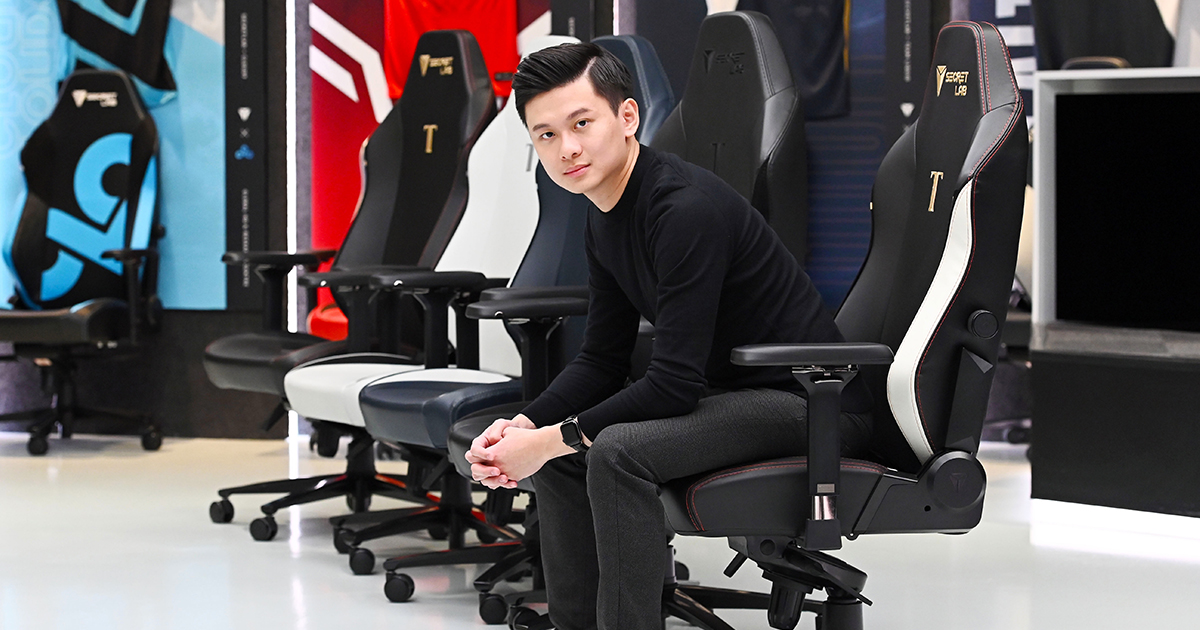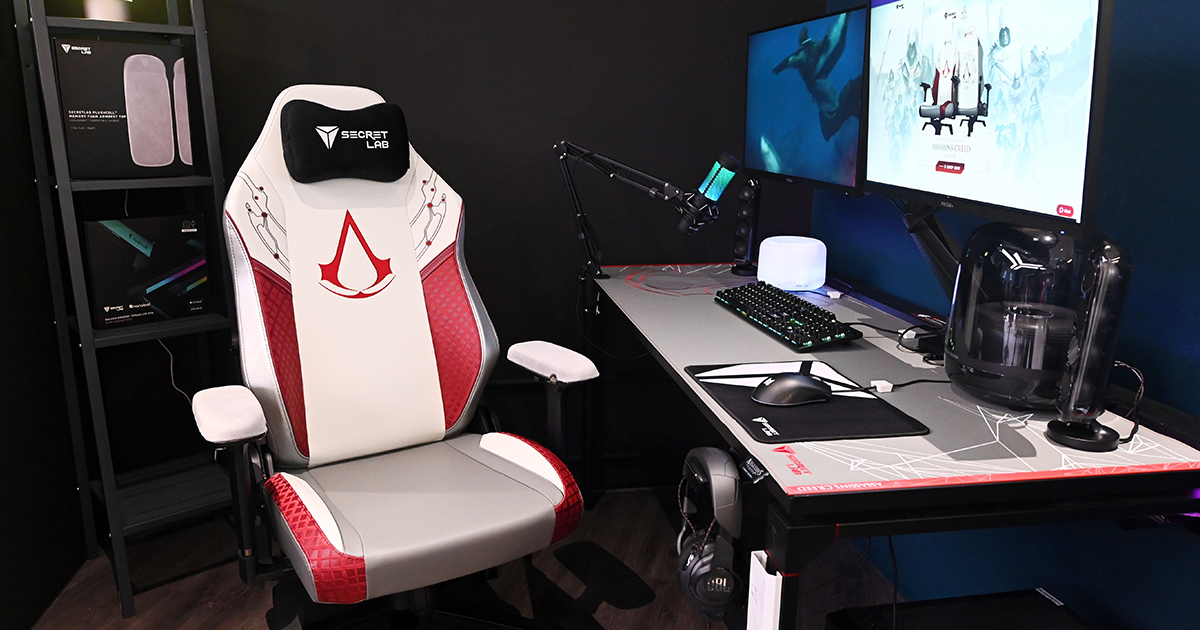First published in The Business Times on 16 August 2022.

Soon after Ian Ang and Alaric Choo founded gaming chair company Secretlab in 2014 and found success in Singapore with their first product, they were confronted with a crucial choice about the firm’s future.
“To keep growing, we could diversify into multiple product lines, or continue to make the best possible chair and go overseas with it,” said Ang, 30, the company’s chief executive officer and head of marketing. Choo, 34, is its chief strategy officer.
Buoyed by their successful debut – the inaugural edition sold out its initial run of 200 units in a week, and the firm recouped its initial investment of S$50,000 within a month – they opted to expand overseas, making their first foray into Malaysia and Australia in 2015 and 2016 respectively.
“They are relatively nearby and large markets, but not so huge that we would have difficulty navigating them,” Ang explained.
Today, the firm makes more than 1 million chairs annually for customers in over 50 countries, with North America and the European Union (EU) being its largest markets. Singapore accounts for less than 5 per cent of its total sales each year.
It has about 200 staff who work at its global headquarters and research and development (R&D) laboratory in Singapore, where it conducts product design and innovation. It produces its chairs in China and ships them to distribution centres worldwide for delivery to customers. There are no brick-and-mortar Secretlab stores.
Ang shared: “If we had stayed in just Singapore, we would have never achieved this kind of scale. That’s why internationalisation is important, even if it can involve a lot of risk, pain and unknowns.”
World-class products for a global market
For Secretlab, continuously upgrading its chairs to keep them top-of-the-line and noteworthy has been the key to internationalisation.
“We want to have world-class products so that when we enter a new market, we don’t start on the back foot. When you have a great product, all you need to do is tell people about it. You don’t need to try and hoodwink people,” explained Ang, who earned a business studies diploma from Ngee Ann Polytechnic and started Secretlab after failing to find a satisfactory chair for his gaming set-up.
“In fact, our chairs are good and interesting enough that the media will review them, so we get an edge in marketing. Technology editors are discerning and will point out the small details that make our chairs better, which adds to our clout when we enter a new market.”
When the firm released its Titan Evo 2022 series of chairs last year, an upgrade from its 2020 series, popular gaming website GameSpot highlighted the “subtle improvements that make a big difference”, such as better, adjustable lumbar support that automatically adjusts to users’ sitting position.
For the chair’s seat base alone, Secretlab’s designers developed more than 40 iterations of its shape to optimise it for users’ comfort and ease of manufacturing, Ang recalled.
“This included fine-tuning the curvature of the seat’s waterfall edge, which your knees rest on, so that you can easily and comfortably pull your legs back under your chair. Sometimes you want to do that,” he said.
Last year, the firm announced that it would invest S$50 million in R&D over the next few years, and hire about 100 people, including 80 engineers and designers for its product team, to further improve its chairs and meet other goals. It had a 30-strong product team at the time, and has since increased its ranks to over 40.
To facilitate hiring, it is also in talks with universities to come up with a programme to identify and recruit their best students early.
Ang said: “By investing in R&D, we can widen the gap between us and our competitors. Our customers also benefit from our innovations. It’s a win-win strategy for us, especially when it comes to selling our chairs all over the world.”

Building alliances for success
As Secretlab followed customer demand and inquiries to explore new markets, it also tapped government agencies such as Enterprise Singapore (EnterpriseSG) for help.
EnterpriseSG, which supports the local and global growth of Singapore businesses, has a network of satellite offices worldwide.
“If we’re not sure about a country’s regulations or need advice on potential partners, we can check with EnterpriseSG’s officers on the ground. They act in Singaporean businesses’ best interests, so we can trust them more than, say, companies in the country,” Ang said.
EnterpriseSG has supported Secretlab’s entry into new markets, such as the Philippines and Japan, by connecting it to partners, advising it on the markets’ business environments and regulations, and subsidising costs through the Market Readiness Assistance Grant. The grant covers overseas promotion, business development and market set-up expenses, up to various caps.
When Secretlab was looking for logistics partners in Poland to manage deliveries to customers in the EU, for example, it asked EnterpriseSG for advice.
“When you’re just starting out, EnterpriseSG is tremendously helpful because you won’t need to spend a 6-figure sum to learn more about a market, which is what some consultants will charge you,” Ang noted.
Secretlab has also secured partnerships with renowned firms to boost its profile. In 2019, with EnterpriseSG’s support, it started an ongoing collaboration with American video game developer and publisher Riot Games.
Riot Games had in 2009 released League of Legends, an online multiplayer game that has gone on to achieve critical acclaim in the gaming industry.
It currently supplies chairs for participants in 4 League of Legends e-sports competitions, including the Championship Series in North America and the World Championship. It has also designed chair collections inspired by the tournaments’ winners.
“With such partnerships, we have become a lot more visible on the global stage. When people see the world’s best e-sports teams using our chairs, it also strengthens our reputation.
“These players sit in chairs for 16 hours a day. When people see that our chairs are good enough for them, they flock to us,” Ang explained.
The alliance with Riot Games also paved the way for partnerships with other companies and top e-sports teams, to gain exposure to their audiences.
These include video game company Ubisoft, and e-sports teams in different countries, such as T1, Team Liquid and Evil Geniuses.
Ang said that even though Secretlab’s expansion worldwide has posed challenges, such as managing increasingly complicated supply chains, especially in the wake of the Covid-19 pandemic’s disruptions, the company’s growth has made it all worthwhile.
“With the scale that we have now, we can tap on bigger and better manufacturers with more advanced technologies, invest more money in research to keep setting ourselves apart, and do other cool things for our company’s future.
“Internationalisation may be challenging, risky and painful sometimes, but it’s worth it.”
Evolving to support growth
As companies expand their business globally, they should reconsider their supply chains and logistics, and update these if necessary.
Secretlab is currently reworking its manufacturing and distribution system to make it more efficient, shared Ian Ang, Secretlab’s chief executive officer and head of marketing.
Since he co-founded the firm in 2014, it has sourced its chairs’ components internationally, assembled them in China and shipped them to distribution centres worldwide for delivery to customers.
This has enabled it to bypass middlemen, avoid additional mark-ups, keep an overview of stock and respond to customers directly.
With soaring shipping costs and the Covid-19 pandemic exposing the fragility of global supply chains, it is looking at having more manufacturing sites around the world to cut transport costs and minimise future disruptions. With such diversification, it could also deliver chairs to more customers more easily, aiding in further expansion.
“We have always tried to optimise our supply chains and logistics, but last year, we asked ourselves, if we could start over and set them up to cater to the scale that we have now, what would they look like?”
“Our business is at a different scale now compared to years ago, so we need to think about what we should do differently.
“We’ve hired some senior executives over the past 12 months to focus on this. The original Secretlab team is very good at what it does, which is making the best possible chair and selling it. For logistics, we can hire experts to help us, and that’s exactly what we’ve done.”
The firm is exploring a range of ideas, said Ang, who was named Singapore’s Entrepreneur of the Year in 2020 by professional services firm EY, for building Secretlab into a commercial success globally, among other achievements.
“Our distribution centres could be the manufacturing centres themselves. We want to drill all the way down and look at where every part comes from, the distances to the distribution centres and more, and make sure that we are ready for the future.”

